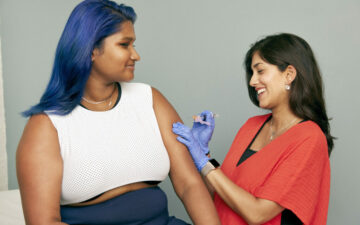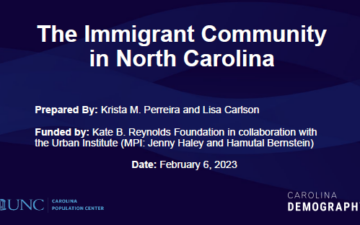NC in Focus: The Sex Gap in Postsecondary Attainment

Nationally, 46% of women aged 25-64 reported having an associate degree or higher in 2017 compared to 39% of men, a gap of seven percentage points. In North Carolina, this gap was even larger: 48% of women had an associate degree or higher compared to 38% of men, a gap of 10 percentage points.
Compared to men, North Carolina women are more likely to report the completion of an associate degree (11.9% vs. 8.3%), bachelor’s (23.3% vs. 20.1%), or master’s (9.8% vs. 6.8%) degree. Men are slightly more likely than women to hold a professional degree (1.8% vs. 1.7%) or a doctorate (1.3% vs. 1.1%).
The female-male gap in postsecondary attainment differs by age, reflecting changing norms and expectations about women and work. At older ages—65 and above—men have higher levels of educational attainment, reflecting the different opportunity structures and expectations of the mid-twentieth century. (Among North Carolinians age 65 and older, 38% of men have an associate or higher compared to 30% of women.)
As women entered the workforce in increasing numbers in the 1960s and 1970s, female educational attainment also increased. The female-male difference in educational attainment emerges among individuals ages 55-64 (born between 1953 and 1962), with 42% of women reporting an associate degree or higher compared to 37% of men. This gap widens in younger generations, driven by steady increases in female educational attainment and relatively small changes in men’s overall attainment.
Among North Carolinians ages 45-54, the female-male attainment gap is 10 percentage points: 47% of women report an associate degree or higher compared to 37% of men. The difference increases to 12 percentage points among 35-44-year-olds, with 52% of women holding an associate degree or higher compared to 40% of men and remains at 12 percentage points among adults aged 25-34 (51% vs. 39%).
Next up: why is it so important that students graduate from high school on time?
Subscribe to our mailing list to stay up-to-date with our NC education pipeline research.
Need help understanding population change and its impacts on your community or business? Carolina Demography offers demographic research tailored to your needs.
Contact us today for a free initial consultation.
Contact UsCategories: Carolina Demographics, Education
Tags: age, educational attainment, generational change, postsecondary degrees, sex

The Center for Women’s Health Research (CWHR) at the University of North Carolina School of Medicine released the 12th edition of our North Carolina Women’s Health Report Card on May 9, 2022. This document is a progress report on the…

Dr. Krista Perreira is a health economist who studies disparities in health, education, and economic well-being. In collaboration with the Urban Institute, she recently co-led a study funded by the Kate B. Reynolds Foundation to study barriers to access to…

Our material helped the NC Local News Lab Fund better understand and then prioritize their funding to better serve existing and future grant recipients in North Carolina. The North Carolina Local News Lab Fund was established in 2017 to strengthen…
Your support is critical to our mission of measuring, understanding, and predicting population change and its impact. Donate to Carolina Demography today.